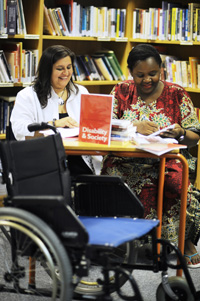Disability studies to the fore in three MPhil theses
12 December 2012 Finishing together: Thesis twins Fatima Essop (left) and Chioma Ohajunwa are two of the three MPhil graduates in Disability Studies who will be capped this month. The third is Mpilo Booi (not in picture).
Finishing together: Thesis twins Fatima Essop (left) and Chioma Ohajunwa are two of the three MPhil graduates in Disability Studies who will be capped this month. The third is Mpilo Booi (not in picture).
Three graduates of the Disability Studies Programme - including two 'thesis twins' - will receive their Master's of Philosophy in Disability Studies on 18 December, their research underscoring the need to better understand the needs of disabled people.
Mpilo Booi and 'thesis twins' Fatima Essop and Chioma Ohajunwa adopted the motto "Nothing about us, without us" as the core of all they do.
Essop focused on parents' and special-care workers' understanding of 'acceptance' and 'denial' in relation to children's intellectual disability. Ohajunwa looked at disability inclusion in teaching and research in the Faculty of Humanities. Booi researched community processes in policy implementation as these relate to access to health, education and social development services for the disabled.
Essop's research provided insight into the concepts of 'acceptance' and 'denial' by exploring parents' and special care workers' understanding of these terms.
Ohajunwa's research, focused on disability inclusion in the Faculty of Humanities curricula, was linked to a bigger, Vice-Chancellor-funded study, Disability in Research Enabling Curriculum Transformation (DIRECT), which surveyed all UCT faculties on the question of disability inclusion.
"My study explored whether disability is included, and how it is included, in the curricula of the Faculty," said Ohajunwa. "Is disability seen as merely a health condition or impairment, or is it perceived as a much bigger socio-political issue?"
She and Essop were dubbed the 'thesis twins' because they share the same values and principles, and did everything together since their first day at UCT - this despite their very different backgrounds.
"When we started our theses, we agreed to write and submit together, no matter what, and we monitored each other's progress and encouraged one another until we crossed the finish line together." Ohajunwa had a baby while writing her thesis, and her bosom pal held back on her own studies so that they could finish together.
Joined at the hip? It would certainly seem so!
 This work is licensed under a Creative Commons Attribution-NoDerivatives 4.0 International License.
This work is licensed under a Creative Commons Attribution-NoDerivatives 4.0 International License.
Please view the republishing articles page for more information.







